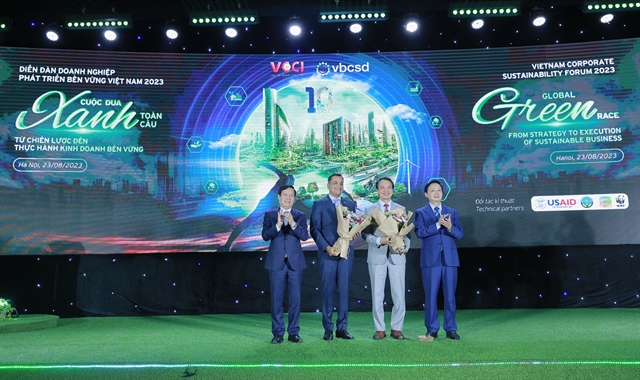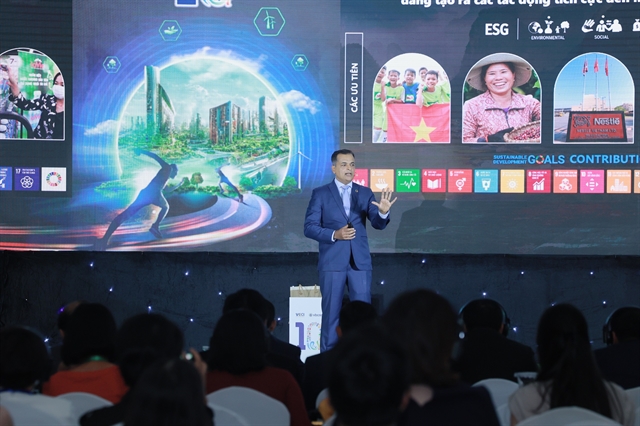 Economy
Economy

 |
| Deputy Prime Minister Trần Hồng Hà (first from right) congratulates VBCSD's chairman and co-chairman for the successful VCSF organization over the past 10 years. Photo courtesy of Nestlé Vietnam |
Innovation and sustainability are two important factors that bring competitive advantages to businesses in the long run, helping firms create value for investors and the community. Innovation also supports businesses to achieve sustainable development goals. Binu Jacob, CEO of Nestlé Vietnam cum co-chairman of the Việt Nam Business Council for Sustainable Development (VBCSD-VCCI) talked to the media about promoting these twin transitions in business at the Việt Nam Corporate Sustainability Forum (VCSF) 2023 held in Hà Nội on Wednesday.
Why do you believe that companies need to implement twin transformations, combining innovation and sustainable development?
As I have just shared at the VCSF meeting, the role of business is not only to deliver shareholder value but also to create societal impact. Businesses can do well by doing good.
To address the world’s most significant societal and environmental challenges, the 2030 Agenda with a focus on 17 Sustainable Development Goals (SDGs) was officially adopted by the United Nations General Assembly in 2015. Achieving the SDGs requires the contribution of all actors, including business. Moreover, businesses that align themselves to SDG can win in the long term.s
For decades, businesses have focused on TSR. However, to achieve sustainable and long-term development, businesses need to move from (Total Shareholder Return) TSR to Total Societal Impact (TSI). Investors are increasingly interested in businesses that operate efficiently and have positive impacts on the environment, society, and governance.
 |
| Binu Jacob talks about twin transformation at VCSF 2023. Photo courtesy of Nestlé Vietnam |
How is Nestlé implementing these twin transformations in Việt Nam?
Solving societal problems is in the DNA of Nestlé. In Việt Nam, Nestlé is implementing many sustainable initiatives to make a positive impact on the environment and society, with priorities including children's health, responsible sourcing, climate actions and caring for water, gender equity, and sustainable packaging.
In order to help Vietnamese children stay active, Nestlé Vietnam partnered with the Ministry of Education and Training to implement the “Active Việt Nam” programme, approaching nearly 8,500 schools in 36 provinces and cities with the participation of 5 million children.
For sustainable sourcing, Nescafé Plan was launched in the Central Highlands provinces since 2011 to support more than 21,000 farmers to access and practice coffee production according to the 4C criteria.
The programme helps reduce 20 per cent of fertilizer use, saves 40 per cent of irrigation water and increases farmers’ income by 30-100 per cent by applying reasonable intercropping models. It also applies digital technology to build digital farmers field book, helping farmers manage their farms better.
For women empowerment and income improvement, we collaborated with the Việt Nam Women's Union to implement the "Chi Nest” in 20 provinces, with participation of 4,600 women.
The programme aims to equip and enhance nutritional knowledge for over one million households nationwide. It also helps create 3,000 grocery stalls to support income generation for women.
What does a company need to do to successfully implement twin transformations, combining innovation and sustainable development?
The successful implementation of “twin transitions’ requires leadership commitment, organisational alignment, and cultural transformation.
Innovation and sustainability should go together to achieve business goals and solve societal problems at the same time.
A business should establish clear metrics and targets for its twin transformations, and regularly monitor and report on its progress.
A business should also engage with stakeholders, including customers, employees, investors, and regulators, to build trust and support for its twin transformations. This could involve transparent reporting on its sustainability performance, as well as regular communication and engagement activities.
In order to realise this transformation goal, in the roadmap to implement the regulations on the Extended Producer Responsibility (EPR) policy to be issued in the near future, how has Nestle prepared to enforce these regulations?
The recycling of packaging is an important commitment and it requires the participation of all parties. For Nestlé Vietnam, sustainable packaging is one of four key commitments on sustainable development. We expect to having most of our packaging to be designed for recycling by 2025. It can be seen that the Government's promulgation of the EPR mechanism will be the driving force to help increase the recycling rate and promote the development of the circular economy in Việt Nam.
We have been preparing for EPR implementation since three years ago. So for us, implementing mandatory EPR regulations is not a challenge. We will strive to achieve the highest possible self-recycling rate. However, given the current infrastructure, collection, classification and processing capacity in Việt Nam, there will still be a certain percentage of businesses that choose to pay fees in the short term. For the effective implementation of EPR, we hope that the Government will issue regulations suitable to actual conditions and in harmony with international practices. In the long term, we hope the Government will have policies to promote infrastructure development and improve recycling capacity so that businesses can soon achieve the highest self-recycling rate.




